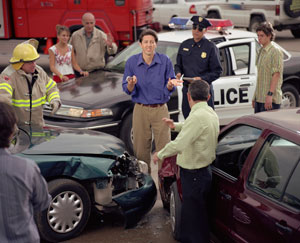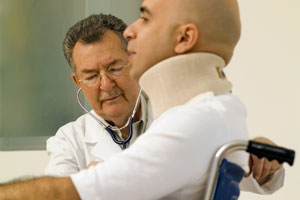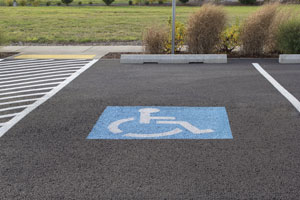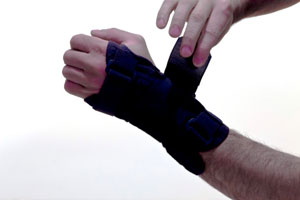Protecting Your Rights after You Have Been Hurt in a Motor Vehicle Accident
 In the aftermath of an automobile accident, in the confusion and uncertainty that can abound, it can be easy to forget to take simple steps to protect your rights. Here are the most important things to do.
In the aftermath of an automobile accident, in the confusion and uncertainty that can abound, it can be easy to forget to take simple steps to protect your rights. Here are the most important things to do.
Get the Medical Care You Need
This is legal, as well as medical, advice. Before you can even think about protecting your legal rights, you need to make certain you get all the treatment you need. Remember, this isn’t the time to be brave. Don’t try to shake off serious injuries. If you find it difficult to move under your own power, don’t try to do so. Let emergency responders come and examine you. They will take every precaution to ensure that you don’t make your injuries worse, and that you get the care you need.
Even if you leave the scene under your own power, take yourself to an emergency clinic, a hospital emergency room, or make an immediate appointment with your doctor. You may have injuries that have not yet surfaced. Get a checkout and tell medical personnel exactly what happened and advise them of anything that feels out of the ordinary. Don’t just focus on the most obvious injury—don’t let all the attention focus on your broken leg without telling them that you hurt your back or neck, or bumped your head.
Getting the medical treatment you need is critical to protecting your legal rights. When you seek damages, a significant portion of your recovery will be based on any physical injuries you suffer. You need to document them as soon as possible, so that defense attorneys don’t try to claim they were the result of some event other than the motor vehicle accident.
Gather as Much Information as You Can
The more information you gather, the easier it will likely be for your attorney to prepare a case to help you get full and fair compensation for your losses. If you can, get basic contact information from anyone else involved in the accident, as well as witnesses. This includes name, phone number, e-mail address, home address, and name of their insurance company.
It can also be beneficial to get pictures. Use the camera on your phone, if necessary. Take pictures of anything related to the accident, from the damage to your vehicle or any bruises or scrapes you may have to skid marks, traffic signals and signs, and even weather conditions.
Contact Us
At Taylor & Boguski, we bring more than 70 years of combined legal experience to injured people throughout New Jersey. For a free initial consultation, contact our office online or call us at 856-234-2233.


 When you have suffered a physical injury because of someone else’s carelessness or negligence, the measure of your losses can be pretty straightforward. Things become far more complicated when most of the injury is emotional or psychological. You have a right, though, to pursue damages if the wrongful acts of another person caused you unnecessary stress, anxiety or mental anguish.
When you have suffered a physical injury because of someone else’s carelessness or negligence, the measure of your losses can be pretty straightforward. Things become far more complicated when most of the injury is emotional or psychological. You have a right, though, to pursue damages if the wrongful acts of another person caused you unnecessary stress, anxiety or mental anguish. In New Jersey, when you have suffered injury or illness because of work conditions, you have the right to pursue benefits for medical expenses and lost wages. The process, however, can be confusing and intimidating—many legitimate claims are initially denied.
In New Jersey, when you have suffered injury or illness because of work conditions, you have the right to pursue benefits for medical expenses and lost wages. The process, however, can be confusing and intimidating—many legitimate claims are initially denied. When you are unable to work because of injury or illness, you can look to private or employer-sponsored disability insurance. But you are not without options if you don’t have this type of coverage. Regardless of your age, if you meet the requirements, you can receive payments under a Social Security disability insurance or Supplemental Security income claim.
When you are unable to work because of injury or illness, you can look to private or employer-sponsored disability insurance. But you are not without options if you don’t have this type of coverage. Regardless of your age, if you meet the requirements, you can receive payments under a Social Security disability insurance or Supplemental Security income claim. As in all states, when you suffer a workplace injury in New Jersey, you have a right to pursue benefits under the state’s workers’ compensation laws. You must notify your employer in a timely manner, and you must submit to a physical examination from a doctor chosen by your employer. If your claim is approved, though, you may be entitled to receive a broad range of benefits.
As in all states, when you suffer a workplace injury in New Jersey, you have a right to pursue benefits under the state’s workers’ compensation laws. You must notify your employer in a timely manner, and you must submit to a physical examination from a doctor chosen by your employer. If your claim is approved, though, you may be entitled to receive a broad range of benefits. Though New Jersey courts are generally less inclined now to grant alimony or spousal support in divorce proceeding than in years past, either party to a divorce may still pursue compensation after a marital breakup. When a party to divorce requests alimony, the court will consider a number of factors to determine whether the petition has merit. The court may grant permanent support, order payments for a specific period of time, or require a party to pay support until the ex-spouse can take care of his or her own needs.
Though New Jersey courts are generally less inclined now to grant alimony or spousal support in divorce proceeding than in years past, either party to a divorce may still pursue compensation after a marital breakup. When a party to divorce requests alimony, the court will consider a number of factors to determine whether the petition has merit. The court may grant permanent support, order payments for a specific period of time, or require a party to pay support until the ex-spouse can take care of his or her own needs. According to a recent study, nearly 20,000 bicyclists were injured in collisions with motor vehicles during a ten year period. Not surprisingly, 81 of those accidents proved fatal to the bicyclist.
According to a recent study, nearly 20,000 bicyclists were injured in collisions with motor vehicles during a ten year period. Not surprisingly, 81 of those accidents proved fatal to the bicyclist.  Under the laws of New Jersey, when you are hurt during the course of employment, you have a right to pursue monetary compensation for lost wages, medical expenses and even job retraining, if you can’t return to your previous job. The injury, though, does not have to arise from a single traumatic event—a fall or the malfunction of a machine or tool. Often, the most debilitating injuries are those that develop over time, from standing, bending, lifting, squeezing or pinching over and over and over.
Under the laws of New Jersey, when you are hurt during the course of employment, you have a right to pursue monetary compensation for lost wages, medical expenses and even job retraining, if you can’t return to your previous job. The injury, though, does not have to arise from a single traumatic event—a fall or the malfunction of a machine or tool. Often, the most debilitating injuries are those that develop over time, from standing, bending, lifting, squeezing or pinching over and over and over.  If you are involved in a
If you are involved in a  In New Jersey, as in all states, the owner/manager/resident of residential or commercial property has a duty to maintain the premises in such a way as to minimize the risk of injury to anyone legally on the property. This obligation has far-reaching consequences, including:
In New Jersey, as in all states, the owner/manager/resident of residential or commercial property has a duty to maintain the premises in such a way as to minimize the risk of injury to anyone legally on the property. This obligation has far-reaching consequences, including: